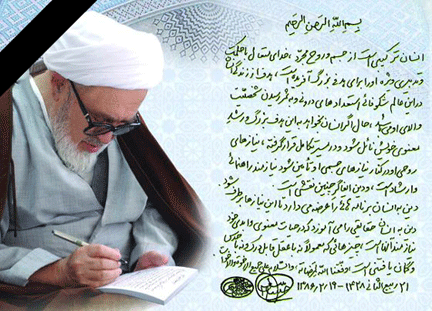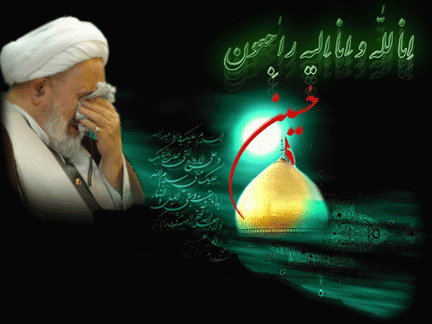
Image of the Ayatollah from his Persian website
One of the most vocal opponents of the hardliners in the Islamic Revolution and of the recent election fixing by President Ahmadinejad was the Grand Ayatollah Hossein Ali Montazeri, who has died at the age of 87. Reports of the funeral in Qum are based on eyewitnesses, since the government of Iran has forbidden journalists to cover the burial. The New York Times has a lengthy article by Robert Wirth with the following general information:
Ayatollah Montazeri was widely regarded as the most knowledgeable religious scholar in Iran, and that gave his criticisms special potency, analysts say. His religious credentials also prevented the authorities from silencing or jailing him. Last month, he stunned many in Iran and abroad by apologizing for his role in the 1979 takeover of the American Embassy in Tehran, which he called a mistake. Iran’s leaders celebrate the takeover every year as a foundational event of the Islamic revolution.
Ayatollah Montazeri, who long advocated greater civil liberties and women’s rights in Iran, was angered by the bloody crackdown that followed the June election and issued a series of remarkable broadsides against the authorities. “A political system based on force, oppression, changing people’s votes, killing, closure, arresting and using Stalinist and medieval torture, creating repression, censorship of newspapers, interruption of the means of mass communications, jailing the enlightened and the elite of society for false reasons, and forcing them to make false confessions in jail, is condemned and illegitimate,†he wrote.
Ayatollah Montazeri was born in 1922 in Najafabad to a peasant family. He studied under Ayatollah Khomeini in Qum and became involved in networks opposed to Shah Mohammed Reza Pahlavi, which resulted in a four-year prison term in 1974. After the revolution in 1979, he played a central role in creating Iran’s new Constitution, in part because of his authorship on the doctrine of rule by clerics. But he argued that clerics should play an advisory role and not rule directly.
In the years after the revolution, Ayatollah Montazeri served as the Friday Prayer leader in Qum and as a deputy to Ayatollah Khomeini, who designated him as his successor in 1985. Although he lacked a large popular following, the senior ayatollah viewed him as a loyal supporter of the concept of clerical rule.
But Ayatollah Montazeri gradually began to move away from his mentor’s policies. In 1989, after a mass execution of political prisoners, he published an article condemning the decision and calling for a “political and ideological reconstruction.†He also mocked Ayatollah Khomeini’s fatwa calling for the killing of the novelist Salman Rushdie, saying, “People in the world are getting the idea that our business in Iran is just murdering people.â€
Ayatollah Khomeini quickly denounced Ayatollah Montazeri, who was stripped of his post. The state news media no longer called him a grand ayatollah and instead began to refer to him dismissively as a “simple-minded†cleric. In 1997, he was placed under house arrest after criticizing Ayatollah Khomeini’s successor as supreme leader, Ayatollah Khamenei. The restriction ended in 2003 after Iranian legislators called on Iran’s president then, the reformist cleric Mohammad Khatami, to release him.
Ayatollah Montazeri continued to teach and to write, championing the reformist cause and calling for greater democracy. “Independence is being free of foreign intervention, and freedom is giving people the freedom to express their opinions,†he wrote recently. “Not being put in prison for every protest one utters.â€
Those who would be foolish enough to rely on Fars, the official Iran news agency, English service will find no mention of the Ayatollah’s death.

Source:http://montazeri.biz/